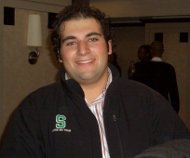8/3/2012
Michigan Supreme Court Upholds Right to Insult Meter MaidsHigh court in Michigan overturns statute that criminalized yelling at a meter maid.

A former Michigan State University (MSU) law student last week beat the system after taking a case arising out of a parking ticket before the state's highest court. Jared Rapp, arguing on his own behalf, convinced the justices that the ordinance used to convict him was unconstitutional.
A district court judge slapped Rapp with an $873 fine, a mandatory anger management course, 80 hours of community service and two years of probation because Rapp yelled at MSU meter maid Ricardo Rego who had issued a ticket to Rapp on September 16, 2008. Rapp pulled up to Rego and demanded to know whether he was responsible for the citation. Rego called campus police who arrived 15 minutes later, eventually charging Rapp with violating MSU Ordinance 15.05.
"No person shall disrupt the normal activity or molest the property of any person, firm, or agency while that person, firm, or agency is carrying out service, activity or agreement for or with the university," the ordinance states.
Rapp based his case on the 1987 US Supreme Court case Houston v. Hill which found unconstitutionally overbroad under the First Amendment a municipal ordinance that made it a crime to interrupt a police officer. The justices in that case stated police should not be given the ability to arrest individuals for words or conduct that offend them. A majority of the Michigan justices found the MSU ordinance was even broader in scope than the Houston ordinance.
"Like the ordinance that the United States Supreme Court invalidated in Hill, the verbal disruptions that the MSU ordinance criminalizes are not limited to those containing fighting words or obscene language," Justice Diane M. Hathaway wrote for the Michigan court majority. "Instead, the MSU ordinance explicitly criminalizes any disruption of the normal activity of persons or entities carrying out activities for or with MSU. Not only does the ordinance fail to limit the types of disruptions that are prohibited, it also protects a much broader class of individuals than the ordinance at issue in Hill."
The majority pointed out that other statutes already prohibit physical assault, so the MSU ordinance in large part criminalizes speech. Rapp did lose his argument that the state should pay the costs he incurred defending himself against a prosecution based on an unconstitutional statute. The justices found no statutory basis for awarding such costs in a criminal case.
Two justices dissented from the opinion striking down the MSU ordinance, arguing the Hill case was completely different because it made it unlawful to "interrupt" a police officer whereas the MSU ordinance used the word "disrupt." Rapp believes the decision will help others around the country.
"This is a very significant victory for not only myself but also college students across Michigan and probably across the United States," Rapp told TheNewspaper. "The very wise majority made a big statement by refusing to apply logic that, simply due to a partially 'academic' environment, adults on campus property wherever it may be throughout the state are subject to reduced freedoms. Such a holding would certainly have been unnecessary considering that there isn't the same role of the college administration acting in loco parentis for adult students. It could have also been devastating for rights of the general public who participate in any 'organized' activity, like a state fair, perhaps. Where would we have drawn the line?"
A copy of the decision is available in a 100k PDF file at the source link below.


